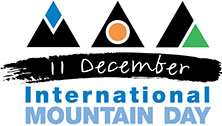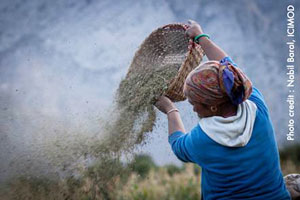
Supporting mountain family farming for food security and prosperity in the Hindu Kush Himalayas
11 December 2014: On the occasion of International Mountain Day 2014, the International Centre for Integrated Mountain Development (ICIMOD) is happy to join the nations and people of the Hindu Kush Himalayas in celebrating this important day. The theme for this year is 'Mountain Farming'. This event is intended to raise awareness on the role of family farming in alleviating hunger and poverty, providing food and nutritional security, improving livelihoods, promoting responsible natural resource management, protecting the environment, and contributing to sustainable rural development.
The Hindu Kush Himalayan region (HKH), which stretches from Afghanistan to Myanmar, is a global hotspot for biodiversity and a major source of food, water, energy, and numerous invaluable ecosystem services. More than 100 mountains in the region stand more than 7,200 meters above the sea level. The region is endowed with rich biodiversity, spectacular landscapes, and is undoubtedly the roof of the world. Further, it serves as the water tower of Asia, with about 54,000 glaciers storing about 6,000 cubic kilometres of fresh water that supports the lives of 1.3 billion people in Asia.
Of this 1.3 billion people, 210 million people living in the mountains of the Hindu Kush Himalayas largely depend on family farming as the basis for sustainable food production, employment, and the preservation of the unique socio-cultural heritage of mountain communities. The rich biological diversity that exists in agricultural landscapes and common property land across the region continues to be managed by smallholder mountain farmers, often from poor and indigenous groups, for food and nutritional security and to support their livelihoods. These family farms practise traditional agricultural production and preserve indigenous farming knowledge, which are crucial for sustainable agriculture and long-term food security. For centuries, family farming has been the cornerstone of the economies of the Hindu Kush Himalayas.
 Over the last decade, family farming in the Hindu Kush Himalayan region has experienced rapid transformation. However, the small size of farms, low productivity, high input costs, poor access to technologies and specialized knowledge, lack of market orientation and limited access to credit hinder the ability of mountain farmers to adapt to change. Post-harvest losses, especially in the absence of rural food processing enterprises, and added pressures from wildlife depredation pose additional challenges. Thus, communities in the mountains suffer from a high degree of poverty and increased vulnerability to disasters, including threats from glacial lake outbursts, frequent droughts, and irregular rainfall patterns. The mountain areas are also witnessing a high degree of outmigration, especially of male household members.
Over the last decade, family farming in the Hindu Kush Himalayan region has experienced rapid transformation. However, the small size of farms, low productivity, high input costs, poor access to technologies and specialized knowledge, lack of market orientation and limited access to credit hinder the ability of mountain farmers to adapt to change. Post-harvest losses, especially in the absence of rural food processing enterprises, and added pressures from wildlife depredation pose additional challenges. Thus, communities in the mountains suffer from a high degree of poverty and increased vulnerability to disasters, including threats from glacial lake outbursts, frequent droughts, and irregular rainfall patterns. The mountain areas are also witnessing a high degree of outmigration, especially of male household members.
ICIMOD recognizes that the HKH is undergoing rapid transformation as a result of many factors: climatic changes, changes in land use, infrastructure, urbanization in mountain areas, rapid development of communication tools, and outmigration are some examples. Because of the unique characteristics of mountains that set them apart from the plains, ICIMOD and its partners are working to promote differentiated and mountain-specific policies that support sustainable mountain development and adaptation to change. ICIMOD's initiatives focus on generating knowledge to improve our understanding and designing, customizing, and promoting mountain-specific livelihood improvement approaches and tools for the region, including poverty and vulnerability assessments, innovative livelihood options like the community-based ecotourism and heritage tourism or the use remittances from migration, and investment in high-value niche products.
ICIMOD's regional programmes and initiatives provide a platform for partners and stakeholders to generate relevant data and knowledge and to link science to policy and practice. The Centre's work with climate change adaptation and its transboundary approaches to landscape and river basin management place people and communities at the centre of research and interventions. Principles of access and benefit sharing, promoting gender inclusiveness, and strengthening efficient governance mechanisms are at the core of ICIMOD's programmes. Value chain development models that embody these principles have been successfully piloted, with increasing participation of the private sector and greater emphasis placed on valuing ecosystems services. ICIMOD's community-based and ecosystem-based approaches are geared to support adaptation and build the resilience of mountain farmers.
As a regional intergovernmental organization dedicated to sustainable development in the Hindu Kush Himalayas, ICIMOD is well placed and committed to playing a pivotal role in addressing challenges in the mountains and leveraging emerging opportunities to benefit the people of the region. We are committed to strengthening the engagement of diverse stakeholders in the generation of multidisciplinary knowledge, including on the cross-cutting themes of gender, governance, poverty reduction, climate change adaptation, and traditional knowledge, and to support best practices and policies so that family farming continues to be a significant contributor to the prosperity and wellbeing of mountain communities.
ICIMOD will continue to highlight the strategic role of family farming in agricultural and rural development in the region, strengthen engagement with our country partners in building the capacity of family farmers, and foster regional and international cooperation to mobilize efforts and policies that support family farmers across the Hindu Kush Himalayas.
Wishing you all a happy International Mountain Day!
David Molden